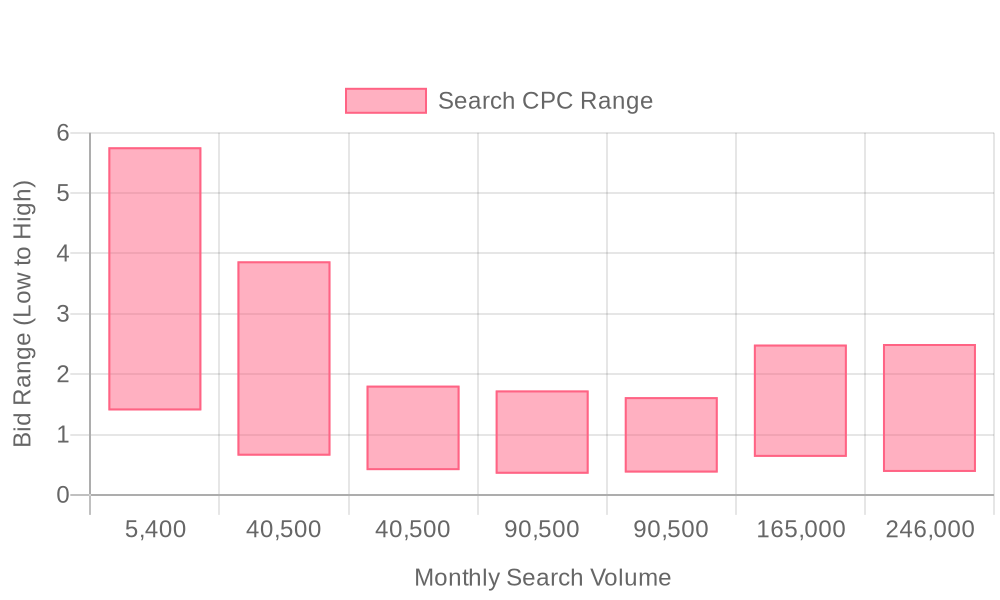
Supercharge your lead generation with a FREE Google Ads audit - no strings attached! See how you can generate more and higher quality leads
Get My Free Google Ads AuditFree consultation

No commitment
Supercharge your lead generation with a FREE LinkedIn Ads audit - no strings attached! See how you can generate more and higher quality leads
Get My Free Google Ads AuditFree consultation

No commitment
Supercharge your lead generation with a FREE Meta Ads audit - no strings attached! See how you can generate more and higher quality leads
Get My Free Google Ads AuditGet My Free LinkedIn Ads AuditGet My Free Meta Ads AuditFree consultation

No commitment
Supercharge your lead generation with a FREE Google Ads audit - no strings attached! See how you can generate more and higher quality leads
Get My Free Google Ads AuditFree consultation

No commitment
In the rapidly evolving landscape of the entertainment industry, marketers face the challenge of reaching diverse audiences across multiple channels. The complexity of capturing the attention of audiences actively seeking entertainment content cannot be overstated. Google Ads offers a robust solution, allowing entertainment marketers to precisely target potential audiences and capture high-intent searches as they happen. This tool provides an effective bridge between awareness and conversion, especially vital during spikes in demand, such as film or event releases. By integrating Google Ads into your strategy, you can enhance your brand’s digital presence within the competitive sector. Discover how you can optimize Google Ads for entertainment to maximize ROI and elevate your marketing strategy.

Modern entertainment marketers need strategies that move in sync with shifting audience preferences and industry disruptions. Precision, agility, and actionable insights are central to outperforming competitors and maximizing every campaign investment.
Data-driven Google Ads strategies help entertainment brands capture diverse audiences by aligning creative assets with real-time intent and high-conversion opportunities. Using advanced audience identification and intent signals, brands can shift spend toward segments most likely to engage, while dynamic audience syncing ensures campaigns adapt as leads progress through the funnel.

Entertainment marketers navigate a fast-moving landscape where capturing audience attention is both an opportunity and a challenge. Reaching the right viewers at the right moment, especially during critical release windows or for live events, requires precision and speed.
Modern solutions enable businesses to identify and engage audiences who are actively seeking entertainment content. With advanced intent signals, marketers can shift spend toward high-potential moviegoers, concert attendees, and streamers when demand surges. Google Ads in Entertainment provides a deeper look at how these technologies are transforming campaign performance.
Sophisticated targeting and integrated data strategies drive visibility in emerging and established markets alike. Marketers leveraging unified go-to-market data can pinpoint not just anonymous traffic, but also identify high-value visitors and companies engaging with trailers, event listings, or playlists. Solutions such as Sona ID support the ability to recognize key audience segments and enable real-time dynamic segmentation as fan interest shifts.
Comprehensive analytics are essential for optimizing entertainment campaigns. Connecting online engagement with offline sales or venue visits provides a single source of truth for performance. For more insights on closing the loop between digital campaigns and real-world conversion, check out our guide on Revenue Attribution.


Modern entertainment brands face saturated digital landscapes and shifting consumer behaviors. Growth depends on identifying new pockets of demand, leveraging advanced audience intelligence, and activating campaigns that adapt in real time to audience interests.
Audience segmentation is essential for entertainment marketers aiming to maximize campaign efficiency and personalize engagement across diverse fan bases. By leveraging detailed segmentation, entertainment brands can fine-tune their outreach, ensuring each message reaches the audience most likely to attend, stream, or purchase.

| Industry | Keyword | Monthly Search Volume | Competition Level | Low Bid | High Bid |
| Entertainment | dj services near me | 5400 | LOW | 1.4 | 5.76 |
| Entertainment | live nation tickets | 40500 | HIGH | 0.65 | 3.87 |
| Entertainment | things to do this weekend near me | 40500 | MEDIUM | 0.41 | 1.81 |
| Entertainment | things to do this weekend | 90500 | MEDIUM | 0.35 | 1.73 |
| Entertainment | events near me this weekend | 90500 | MEDIUM | 0.37 | 1.62 |
| Entertainment | entertainment | 165000 | LOW | 0.63 | 2.49 |
| Entertainment | live music near me | 246000 | LOW | 0.38 | 2.5 |
Entertainment marketers achieve higher ROI by prioritizing precision in their keyword strategies. By focusing on search intent, campaigns reach audiences ready to buy tickets, stream content, or engage with new releases. This approach drives measurable results, ensuring budgets are allocated to users most likely to convert.
Keywords such as "movie premieres near me," "live concert tickets," "new music releases," and "streaming service deals" capture high-intent traffic actively seeking entertainment experiences. These terms align closely with real-time audience interests, supporting stronger click-through and conversion rates across campaigns for movies, music, events, and streaming services. Entertainment Benchmarks shares industry benchmarks for this approach.
Incorporating negative keywords is essential to filter out irrelevant searches, minimizing wasted spend and improving campaign efficiency. Marketers can further elevate their keyword approach by identifying in-market visitor behavior and shifting spend dynamically to high-converting segments. Using platforms that integrate CRM and ad data enables the building of dynamic audience lists, automatically updating as leads progress through sales stages. For more insights on optimizing campaign efficiency, check out our guide on Retargeting Strategies.
This ensures entertainment campaigns continually target the right prospects with relevant offers, improving both engagement and ROI.
Effective campaigns in the entertainment industry begin with robust keyword research that mirrors current audience interests. Focus on themes that align with trending releases, popular events, and anticipated screenings to capture timely demand. Integrate local modifiers such as city names or neighborhood venues to reach users searching for entertainment options in their area. This approach ensures that campaigns are not only relevant but also positioned to attract high-intent traffic— event promotion with Google Ads provides a deeper look at this trend.
Go deeper by filtering out keywords that typically draw unqualified visitors. Removing ambiguous or unrelated terms minimizes wasted spend and sharpens budget efficiency. Unifying first-party data and cross-channel insights can help marketers pinpoint which keyword clusters drive conversions, as behavioral data often reveals new high-intent search patterns. Platforms like Sona ID tools are designed to help marketers identify both anonymous and known visitors, enabling dynamic updates to keyword lists as audience interests shift.
Ad copy is where campaigns come to life and connect emotionally with fans. Highlight exclusive incentives such as early ticket access, limited-edition merchandise, or backstage passes to create buzz and urgency. Effective calls-to-action like “Book Now for VIP Access” or “Unlock Early Bird Pricing” should feel natural and directly tied to the user’s entertainment interests.
Personalization elevates campaign performance. By leveraging unified audience profiles and real-time behavioral insights, marketers craft messages that speak to what each segment values most. For more insights on maximizing return from paid media, check out our guide on boosting Google Ads ROAS. This tailored approach is especially impactful for Google Ads for music, event promotion, and seasonal entertainment launches.
Landing pages must maintain the momentum created by compelling ads. Ensure every landing page is tightly aligned with the ad’s promise, guiding users seamlessly to specific actions like ticket purchases, RSVP confirmations, or content streaming. Frictionless design, fast load times, and prominent calls-to-action reduce drop-off, increasing the likelihood of conversion.
Integrating real-time CRM and ad data enables teams to personalize landing page content for returning visitors or segmented audiences. For example, a visitor previously identified as a high-value lead can be shown premium ticket options or exclusive content offers upon their return. This approach not only increases immediate conversions but also supports ongoing audience nurturing for future entertainment promotions. Varos benchmarks share industry metrics for this approach.
Continuous optimization transforms a good campaign into a great one. Regularly test variations of ad creative, headlines, and landing page layouts to uncover which combinations generate the highest engagement and sales. Use A/B testing frameworks that incorporate both digital and offline event data, so every optimization reflects the full customer journey.
Holistic attribution is critical for entertainment industry marketers who need to understand the true ROI of each campaign. As discussed in our attribution guide, connecting online engagement with offline ticket sales or in-person attendance offers a comprehensive view of performance. When audience segments and conversion data are unified and synced across platforms, marketers can shift budgets to the highest-performing segments in real time, ensuring every dollar invested delivers measurable impact. Dynamic audience updates and advanced conversion tracking keep campaigns agile as entertainment trends and audience behaviors evolve.

Strategically broadening reach in the entertainment sector requires coordinated tactics that engage audiences where they are most active. A successful approach blends memorable content, local relevance, and expert partnerships to drive both awareness and measurable outcomes.
Effective execution of Google Ads within the entertainment industry hinges on strategic precision and agility. Marketers who rely on audience behavior data can continually refine their targeting, ensuring each campaign reaches the most receptive segments and maximizes relevance.
Developing creative that resonates with diverse entertainment audiences is equally essential. Tailoring messaging for moviegoers, music fans, or event attendees fosters authentic connections and increases the likelihood of engagement and conversion. Platforms like Sona Identification help marketers move beyond generic traffic by dynamically adapting creative assets to speak directly to the interests and intent of each segment.
Consistent optimization is achieved through seamless data integration, connecting insights from every touchpoint across channels. By aligning CRM, website, and ad performance data, teams unlock a unified view of the customer journey, making it easy to sync enriched audiences with ad platforms and optimize spend toward high-converting accounts. Varos Benchmarks shares industry benchmarks for this approach, providing clarity on performance expectations.
A commitment to continuous learning and adaptation ensures long-term success. Entertainment marketers who embrace a culture of experimentation, regularly assessing new formats and tactics, stay ahead of evolving consumer preferences and industry trends. For more insights on campaign optimization, check out our guide on Boosting Google Ads ROAS —driving measurable growth in audience engagement and maximizing conversions in the dynamic entertainment sector.
Google Ads offers a powerful way for entertainment brands to connect with audiences at scale—but only if you leverage its full potential.
From targeting niche demographics to optimizing ad creatives for engagement, we’ve covered how to refine your campaigns for maximum impact in a competitive industry. The right strategy turns impressions into loyal fans and clicks into conversions.
Imagine your campaigns not just reaching viewers, but captivating them—driving ticket sales, streaming sign-ups, or event attendance with precision. The tools are here; it’s time to put them to work.
Ready to see the difference data-driven advertising can make? Start a free trial to experience Sona's platform and its capabilities.
Google Ads allows entertainment marketers to target diverse audiences and capture high-intent searches, enhancing brand presence and maximizing ROI during demand spikes like film or event releases.
Best practices include developing data-driven strategies, implementing specific keyword and audience targeting, creating compelling landing pages and ad creatives, and utilizing performance optimization tactics.
The budget should align with targeting high-converting segments, using data-driven insights to dynamically allocate spend towards audiences most likely to engage and convert.
Effective ad types include search campaigns for high-intent audiences, display ads for building awareness, video ads to drive excitement, and remarketing campaigns for ongoing engagement.
Yes, Google Ads offers comprehensive analytics, including online and offline conversion tracking, which helps optimize campaigns by providing insights into performance and audience engagement.
Join results-focused teams combining Sona Platform automation with advanced Google Ads strategies to scale lead generation

Connect your existing CRM

Free Account Enrichment

No setup fees
No commitment required

Free consultation

Get a custom Google Ads roadmap for your business
Join results-focused teams combining Sona Platform automation with advanced Meta Ads strategies to scale lead generation

Connect your existing CRM

Free Account Enrichment

No setup fees
No commitment required

Free consultation

Get a custom Google Ads roadmap for your business
Join results-focused teams combining Sona Platform automation with advanced LinkedIn Ads strategies to scale lead generation

Connect your existing CRM

Free Account Enrichment

No setup fees
No commitment required

Free consultation

Get a custom Google Ads roadmap for your business
Join results-focused teams using Sona Platform automation to activate unified sales and marketing data, maximize ROI on marketing investments, and drive measurable growth

Connect your existing CRM

Free Account Enrichment

No setup fees
No commitment required

Free consultation

Get a custom Google Ads roadmap for your business
Over 500+ auto detailing businesses trust our platform to grow their revenue
Join results-focused teams using Sona Platform automation to activate unified sales and marketing data, maximize ROI on marketing investments, and drive measurable growth

Connect your existing CRM

Free Account Enrichment

No setup fees
No commitment required

Free consultation

Get a custom Google Ads roadmap for your business
Over 500+ auto detailing businesses trust our platform to grow their revenue
Join results-focused teams using Sona Platform automation to activate unified sales and marketing data, maximize ROI on marketing investments, and drive measurable growth

Connect your existing CRM

Free Account Enrichment

No setup fees
No commitment required

Free consultation

Get a custom Google Ads roadmap for your business
Over 500+ auto detailing businesses trust our platform to grow their revenue
Our team of experts can implement your Google Ads campaigns, then show you how Sona helps you manage exceptional campaign performance and sales.
Schedule your FREE 15-minute strategy sessionOur team of experts can implement your Meta Ads campaigns, then show you how Sona helps you manage exceptional campaign performance and sales.
Schedule your FREE 15-minute strategy sessionOur team of experts can implement your LinkedIn Ads campaigns, then show you how Sona helps you manage exceptional campaign performance and sales.
Schedule your FREE 15-minute strategy sessionOur team of experts can help improve your demand generation strategy, and can show you how advanced attribution and data activation can help you realize more opportunities and improve sales performance.
Schedule your FREE 30-minute strategy sessionOur team of experts can help improve your demand generation strategy, and can show you how advanced attribution and data activation can help you realize more opportunities and improve sales performance.
Schedule your FREE 30-minute strategy sessionOur team of experts can help improve your demand generation strategy, and can show you how advanced attribution and data activation can help you realize more opportunities and improve sales performance.
Schedule your FREE 30-minute strategy sessionOur team of experts can help improve your demand generation strategy, and can show you how advanced attribution and data activation can help you realize more opportunities and improve sales performance.
Schedule your FREE 30-minute strategy session





Launch campaigns that generate qualified leads in 30 days or less.
